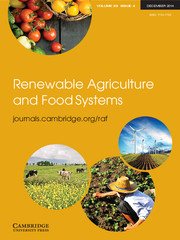Article contents
Agri-food firms, universities, and corporate social responsibility: what's in the public interest?
Published online by Cambridge University Press: 03 September 2018
Abstract
The complexities of the global agri-food system and the singular importance of food as a primary good elevate the need to explore what corporate social responsibility (CSR) might mean for agri-food firms. Although CSR refers to voluntary actions on the part of capitalist firms to exceed legal and regulatory requirements, those requirements are important because they set the institutional foundation for what a firm must do to earn the CSR label. In the case of CSR for agri-food firms, the institutional context includes the regulatory state as well as the publicly supported agricultural and food research and development that tends to be done at universities. The purpose of this paper is to provide greater conceptual clarity to the blur between the state, agri-food firms, and universities and their respective responsibilities to the public. Since the globalization of the agri-food system and the emergence of private forms of governance signal the decline of the state's legal and regulatory influence on corporate firms, we pay particularly close attention to the ethical challenges that have surrounded university–agribusiness collaborations—initiatives, which conjoin the moral concerns associated with each respective institution while also raising new questions in their own right. Although the university would ideally play a critical participatory role in this process by virtue of its public commitments, as we explain, the historical relationship between the university and agri-food firms has complicated the university's potential standing as an independent arbiter. Upon examining each of these issues in greater detail, we conclude the paper with a blueprint for how universities can enhance their ethical leadership when engaging with agri-food firms.
Keywords
- Type
- Research Paper
- Information
- Copyright
- Copyright © Cambridge University Press 2018
References
- 6
- Cited by


